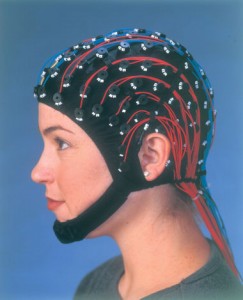As a doctor, I’m always trying to assess where a given patient is along the spectrum of self-tracking readiness. I’ve found that many people fit into one of these three broad categories:
 (http://quantdoctor NULL.com/wp-content/uploads/2011/06/eeg21 NULL.jpg)
(http://quantdoctor NULL.com/wp-content/uploads/2011/06/eeg21 NULL.jpg)- Hardcore Quanter
1) “Hardcore quanter.” They know, or think they know, exactly what they want/need, often specific laboratory tests, devices, or ot
her medical things that require a doctor’s prescription. They also have excellent insight into their health/medical situation, and have already researched all available diagnostic and therapeutic options. I see my role as evaluating their health and proposed experiments to make sure I’m participating in something that is safe and potentially effective, and working as a cooperative partner.
2) “Quant-ready.” They understand that the quickest way to figuring out a mysterious health problem, or to optimizing well-being, can be to self-track symptoms and other biometric or laboratory variables over time, thereby gaining better self-understanding. But they need help designing the experiment, figuring out what to track, and implementing the process in the context of their (often busy) life. This can be time-consuming but is often extremely satisfying all around.
3) “Pre-quant.” They still exist in the passive “I go to a doctor so he can figure out what’s wrong with me and fix it.” paradigm. But with education and motivation many of these can be won over to the N-of-1 research paradigm. I continue to work on ways to communicate these concepts creatively, often using techniques from Motivational Interviewing (http://www NULL.motivationalinterview NULL.org/).
4) “Misguided quanter.” A 92-pound adult with an eating disorder who is obsessed with extreme elimination diets and symptom tracking, while ignoring the elephant in the room. A patient with severe obsessive-compulsive disorder whose self-tracking has eclipsed all social relationships. I try to identify these patients and gently steer them toward the help they need.
5) “Googlers.” Not exactly a quanter, but self-diagnose and select their preferred treatments on their own using online search tools. How this works out can vary widely..
6) Others?
Each of these categories brings up an array of questions – how can doctors best engage with a given patient around self-tracking? How can patients find doctors who are open to facilitating a self-tracking approach to health? What resources need to be developed to make these interactions more efficient and helpful?
Paul Abramson MD


7) Quantophobe. Opposed to QS due to fear of “becoming obsessed”, “unnatural” or other kinds of prejudicions.
8) Random quanter. Starts using some tools after reading about them in pop magazine/news site because “it’s cool”, then abandons one tool, finds another. Eventually may turn to (4) or (7) telling everyone “it doesn’t work”.
9) Pseudo-quanter. Reads and writes a lot on the subject while not doing actually anything.
Vovix: excellent additions. Thanks for contributing!